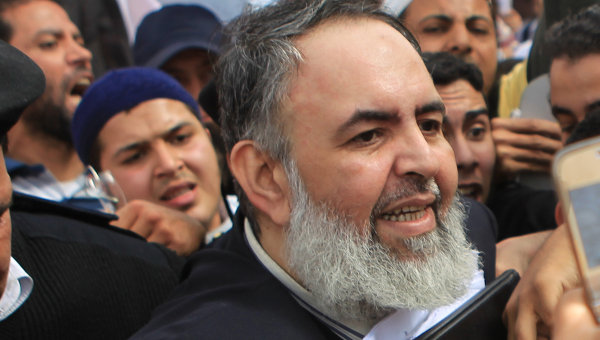Associated Press
MECCA, Saudi Arabia: Rival Palestinian leaders began crucial talks in this holy city Wednesday, vowing to reach a power-sharing agreement to avert civil war between them, a key step toward resuming the peace process with Israel.
Many Palestinians fear that factional fighting will erupt with even greater force if the Mecca talks fail. Gun battles between Hamas and Fatah killed more than 30 people in the days before a truce began Sunday – and in Gaza on Wednesday there were threats of new revenge attacks.
In a sign of unity, Hamas leader Khaled Mashaal and President Mahmoud Abbas, head of the Fatah faction, drove to Mecca in the same car for the first day of what Saudi and Palestinian officials have said will be intensified negotiations that will continue until a deal is hammered out.
We came here to agree and we have no other option but to agree, Mashaal told the inaugural ceremony in a royal palace overlooking the Kaaba, the shrine that all Muslims face in their daily prayers.
Abbas vowed that we will not leave this holy place until we have agreed on everything good, with God s blessing … I tell our people to expect good news, and I hope this [meeting] will not be mere words in the air. Mashaal turned to Abbas at the ceremony and said they both had to tell their supporters to respect the truce. We want to give a message to the nation, and the world, to create a positive atmosphere for these talks, Mashaal said.
But tensions continued in Gaza. Hamas militants warned of new violence unless Fatah officers they accuse of being behind an attack last week on an Islamic university are handed over by the end of the day. Hamas also accused Fatah in the slaying of one of its members in a shooting Tuesday night – though the attack may have been an instance of clan warfare that has overlapped the political battles.
The open-ended talks in Mecca are a high-stakes attempt by Saudi Arabia to mediate an end to the intra-Palestinian battles. The kingdom normally operates behind the scenes in its diplomacy, but it was forced to put its credibility on the line by the violence in Gaza and its fears of a greater eruption of turmoil across the Mideast.
Saudi Arabia insists progress in the Israeli-Arab peace process is more urgent than ever to ease Mideast tensions, fueled in large part by the Iraq war.
The goal of the Mecca talks is to form a coalition government that includes the militant group Hamas – which swept Palestinian elections in January 2006 – yet still recognizes previous peace agreements with Israel. Hamas has long refused to recognize Israel and the past peace accords signed by the Palestine Liberation Organization, of which Fatah is the major member. Talks have also stalled over the issue of who would control security forces in any new Palestinian government.
Israeli Foreign Minister Tzipi Livni said Wednesday that her country would not accept any Palestinian government that does not explicitly renounce violence and accept the right of Israel to exist.
A deal is vital for any resumption of the peace process.
Israel has refused to talk to the Hamas-led government since it took power after the January 2006 elections.
Agreement would also be a big step toward the lifting of the crippling financial embargo that the West imposed on the Hamas government.
But, looking down the road, Hamas has deep worries about what a Mecca agreement might lead to in negotiations with Israel.
Who can guarantee that we will not be making a mistake if we give concessions, as the PLO has done? a member of the Hamas delegation, Mohammed Nazal, told the AP in a phone interview from the Saudi city of Jiddah, near Mecca.
Will we get an independent Palestinian state with Jerusalem is its capital? he said, referring to the long-cherished goals of both Fatah and Hamas.
But on the first day of talks, the emphasis was on unity.
Overnight, Mashaal and Ismail Haniyeh – prime minister of the Hamas-led Palestinian government – called on Abbas in Jiddah, where the two delegations were staying before heading to Mecca.
The meeting was positive, Hamas delegate Abdel Rahman Zaidan told AP. It is clear from the Fatah delegation that Abu Mazen (Abbas) has the intention to reach a deal … From our side, we came determined to reach a deal and to turn the page on division and violence.
Wednesday morning the two sides held their first round of talks in Mecca, agreeing to set up committees to deal with each part of their disputes. Saudi Arabia s King Abdullah then hosted a lunch before talks in the evening with Abbas sitting on the monarch s right, Mashaal on his left during the meal.
The king did not attend the morning talks, and the Saudis have said they want it to be seen that the Palestinians are working out their differences without outside interference.
But Abdullah s hosting of the talks and the Mecca venue show the Saudis strong desire to produce a breakthrough in the Palestinian conflict.
Abbas spokesman, Nabil Amr, said the Fatah delegation wanted the Saudi king to play a direct role. We asked him to intervene because he has the respect of the two parties, Amr said.
That may be a sign that Abbas wants Saudi help to overcome the small but fundamental gaps that remain between the two sides. In the case of the coalttion government s stance over the peace process, it comes down to a single word: Abbas, a moderate who was elected separately in 2005, has insisted Hamas promise to commit to previous agreements, including interim peace deals with Israel.
Hamas is only willing to say it respects such agreements. AP correspondent Salah Nasrawi in Cairo contributed to this report.

